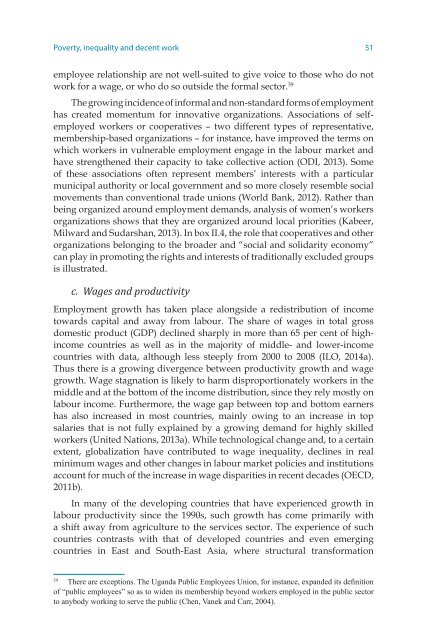Leaving no one behind the imperative of inclusive development
full-report
full-report
Create successful ePaper yourself
Turn your PDF publications into a flip-book with our unique Google optimized e-Paper software.
Poverty, inequality and decent work 51<br />
employee relationship are <strong>no</strong>t well-suited to give voice to those who do <strong>no</strong>t<br />
work for a wage, or who do so outside <strong>the</strong> formal sector. 39<br />
The growing incidence <strong>of</strong> informal and <strong>no</strong>n-standard forms <strong>of</strong> employment<br />
has created momentum for in<strong>no</strong>vative organizations. Associations <strong>of</strong> selfemployed<br />
workers or cooperatives – two different types <strong>of</strong> representative,<br />
membership-based organizations – for instance, have improved <strong>the</strong> terms on<br />
which workers in vulnerable employment engage in <strong>the</strong> labour market and<br />
have streng<strong>the</strong>ned <strong>the</strong>ir capacity to take collective action (ODI, 2013). Some<br />
<strong>of</strong> <strong>the</strong>se associations <strong>of</strong>ten represent members’ interests with a particular<br />
municipal authority or local government and so more closely resemble social<br />
movements than conventional trade unions (World Bank, 2012). Ra<strong>the</strong>r than<br />
being organized around employment demands, analysis <strong>of</strong> women’s workers<br />
organizations shows that <strong>the</strong>y are organized around local priorities (Kabeer,<br />
Milward and Sudarshan, 2013). In box II.4, <strong>the</strong> role that cooperatives and o<strong>the</strong>r<br />
organizations belonging to <strong>the</strong> broader and “social and solidarity eco<strong>no</strong>my”<br />
can play in promoting <strong>the</strong> rights and interests <strong>of</strong> traditionally excluded groups<br />
is illustrated.<br />
c. Wages and productivity<br />
Employment growth has taken place alongside a redistribution <strong>of</strong> income<br />
towards capital and away from labour. The share <strong>of</strong> wages in total gross<br />
domestic product (GDP) declined sharply in more than 65 per cent <strong>of</strong> highincome<br />
countries as well as in <strong>the</strong> majority <strong>of</strong> middle- and lower-income<br />
countries with data, although less steeply from 2000 to 2008 (ILO, 2014a).<br />
Thus <strong>the</strong>re is a growing divergence between productivity growth and wage<br />
growth. Wage stagnation is likely to harm disproportionately workers in <strong>the</strong><br />
middle and at <strong>the</strong> bottom <strong>of</strong> <strong>the</strong> income distribution, since <strong>the</strong>y rely mostly on<br />
labour income. Fur<strong>the</strong>rmore, <strong>the</strong> wage gap between top and bottom earners<br />
has also increased in most countries, mainly owing to an increase in top<br />
salaries that is <strong>no</strong>t fully explained by a growing demand for highly skilled<br />
workers (United Nations, 2013a). While tech<strong>no</strong>logical change and, to a certain<br />
extent, globalization have contributed to wage inequality, declines in real<br />
minimum wages and o<strong>the</strong>r changes in labour market policies and institutions<br />
account for much <strong>of</strong> <strong>the</strong> increase in wage disparities in recent decades (OECD,<br />
2011b).<br />
In many <strong>of</strong> <strong>the</strong> developing countries that have experienced growth in<br />
labour productivity since <strong>the</strong> 1990s, such growth has come primarily with<br />
a shift away from agriculture to <strong>the</strong> services sector. The experience <strong>of</strong> such<br />
countries contrasts with that <strong>of</strong> developed countries and even emerging<br />
countries in East and South-East Asia, where structural transformation<br />
39<br />
There are exceptions. The Uganda Public Employees Union, for instance, expanded its definition<br />
<strong>of</strong> “public employees” so as to widen its membership beyond workers employed in <strong>the</strong> public sector<br />
to anybody working to serve <strong>the</strong> public (Chen, Vanek and Carr, 2004).
















